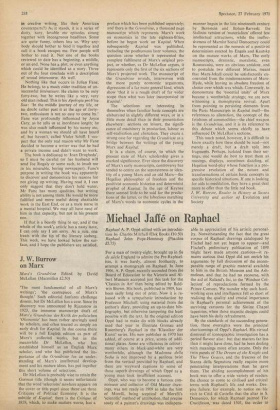J. W. Burrow on Marx
Marx's Grundrisse Edited by David McLellan (Macmillan £2.50) 'The most fundamental of all Marx's writings'; 'the centrepiece of Marx's thought.' Such editorial fanfares challenge dissent, but Dr McLellan has a case. Since its discovery was announced by Rjazanow in 1923, the immense manuscript draft of Marx's Grundrisse der Kritik der politischen `Okonotnie' has been rather sparingly used by scholars, and often treated as simply an early draft for Kapital. In due course there will be a full English edition as. part of Marx's collected works, but in the meanwhile Dr McLellan, who has established himself as an English Marx scholar, and who has publicised the im- portance of the Grundrisse for an under- standing of Marx's intellectual develop- rnent and his mature ideas, has put together this short volume of selections. Dr McLellan is probably wise to retain the German title (though it seems unfortunate that the word 'selections' nowhere appears on the cover or title page) since there are three Critiques of Political Economy. It is the subtitle of Kapital; there is the Critique of 1859, which, to make matters worse, has a preface which has been published separately; and there is the Grundrisse, a thousand page manuscript which represents Marx's work on economics in the late eighteen-fifties, before he began work on Kapital. When subsequently Kapital was published, including the posthumous later volumes, the question arose whether it represented the complete fulfilment of Marx's original pro- ject, or whether, as Dr McLellan argues, it tepresents only the first of the six sections of Marx's projected work. The manuscript of the Grundrisse reveals, interwoven with the more purely economic arguments, digressions of a far more general kind, which show 'that it is a rough draft of far wider scope than what was later incorporated in Kapital.'
The selections are interesting in themselves when familiar basic concepts are elaborated in slightly different ways, or in a little more detail than in their presentation elsewhere : sections on leisure, the signifi- cance of machinery in production, labour as self-realisation and alienation. They create a strong case for regarding the Grundrisse as a bridge between the writings of the young Marx and Kapital.
It is a claim, of course, to which the present state of Marx scholarship gives a marked significance. Ever since the discovery of Marx's early manuscripts, controversy has tended to centre on the separateness or iden- tity of a young Marx and an old Marx—the Hegelian philosopher of freedom and the positivist economic historian and determinist prophet of Kapital. In the age of Keynes there seemed little to be said for the predic- tions of the latter, or the laborious matching of Marx's words to economic cycles in the
manner begun in the late nineteenth century by Bernstein and Bohun-Barvesk; the Stalinist version of 'materialism' offered few intellectual attractions, while the ineffec- tiveness of Marxist Social Democracy could be represented as the nemesis of a positivist determinism erected by Engels and Kautsky on the mature works of Marx. The early manuscripts, dramatic, moralistic, even Rousseauist, were an obvious antidote, and to postulate two different Marxes, meant that Marx-Jekyll could be satisfactorily ex- onerated from the misdemeanours of Marx- Hyde, while leaving us absolute freedom of choice over which was which. Conversely, to demonstrate the 'essential unity' of Marx became a worthwhile strategy; we are now witnessing a monophysite revival. Apart from pointing to persisting elements from the Paris Manuscripts in Kapital itself—the references to alienation, the concept of the fetishism of commodities—the chief weapon is the Grundrisse, and it is its reference to this debate which ,seems chiefly to have influenced Dr McLellan's sections.
This much noted, however, it is difficult to know exactly how these should be read—not merely a draft, but a draft split into fragments. Perhaps, isolated from their set- tings, one would do best to treat them as musings, displays, sometimes dazzling, of Hegelian word-play whose function is a pro- gressive revelation of the nature and transformations of certain basic concepts in specific historical situations. If one is looking for aids to meditation, they have a great deal more to offer than the little red book.
I. W. Burrow, Reader in History at Sussex University and author of Evolution and Society


































 Previous page
Previous page